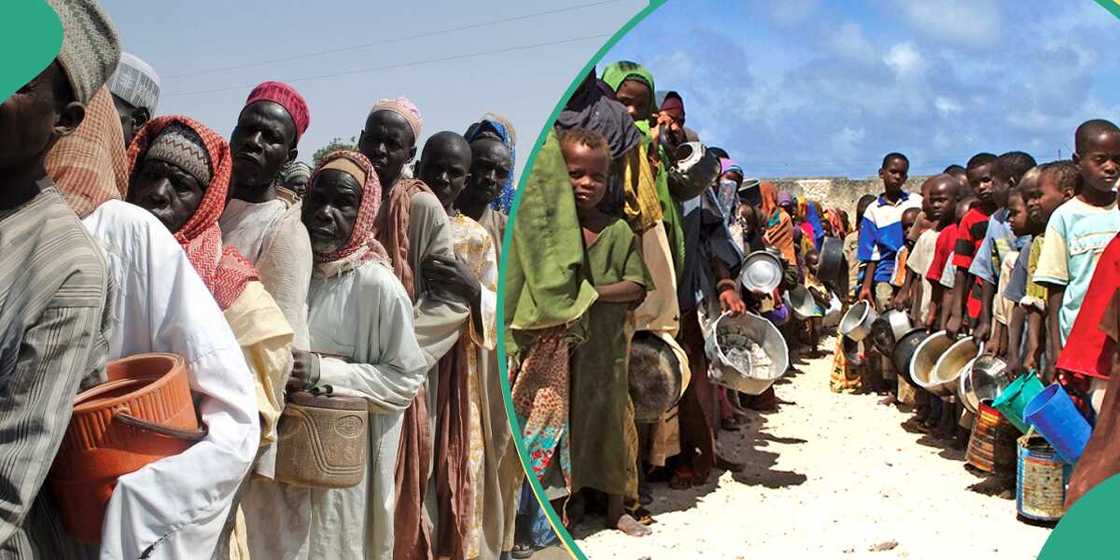Full List: World Bank Predicts Borno, Kaduna, 5 Others Will Face Extreme Food Crisis in 2024
- Seven states in the northern part of Nigeria are at imminent risk of a food crisis in the year 2024
- The World Bank made this prediction in a report that emphasised the critical problem of food insecurity globally
- The food security update also highlighted the factors escalating food insecurity in different parts of the world
- Ifeanyi Ubah, an economist told Legit.ng that the present government must take the right steps to avert the looming crisis
PAY ATTENTION: The 2024 Business Leaders Awards Present Entrepreneurs that Change Nigeria for the Better. Check out their Stories!
Legit.ng journalist Victor Enengedi has over a decade's experience covering Energy, MSMEs, Technology and the stock market.
The World Bank has predicted a significant food crisis in seven northern states in Nigeria in its latest report.
In its Food Security update released in February 2024, the World Bank said the states include Adamawa, Borno, Kaduna, Katsina, Sokoto, Yobe, and Zamfara.

Source: UGC
The latest report has heightened concerns as Nigeria currently ranks 109th among 125 countries grappling with high incidences of hunger, according to the 2023 Global Hunger Index report.
States at crisis food security levels
In the report, the World Bank attributed the impending crisis in the listed states to ongoing insecurity, armed conflicts, and worsening livelihood conditions within Nigeria.
The report stated:
“It is projected that most areas in West and Central Africa will remain Minimally food insecure (IPC Phase 1) until May 2024, with some being categorized as Stressed (IPC Phase 2). Nigeria (far north of Adamawa, Borno, Kaduna, Katsina, Sokoto, Yobe, Zamfara states) will be at crisis food security levels (IPC Phase 3), mostly because of persistent insecurity and armed conflict and deteriorating livelihoods.”
Furthermore, the report highlighted that certain regions within northern states have reached critical levels of food insecurity due to inaccessibility.
Specifically, the areas identified in the report include Abadam, Bama, Guzamala, and Marte.
Three out of the seven states predicted to undergo a severe food crisis are already grappling with significant food insecurity.
As reported by the World Food Programme, the impact of conflict has rendered 4.4 million individuals food insecure across Borno, Adamawa, and Yobe states.
Factors responsible for food insecurity
Various factors, including insecurity and inflation, exacerbate the escalating food insecurity within these regions.
The disruptive actions of bandits and terrorists are displacing communities and impeding their ability to cultivate their farmlands.
In addition to insecurity, Nigeria is grappling with a persistent rise in inflation rates, which peaked at 28.92% as of December 2023.
The food inflation rate also rose to 33.93% despite the diminishing purchasing power of Nigerians.
Consequently, food affordability is becoming a significant challenge for many individuals, particularly internally displaced persons residing in these affected regions.
The Food and Agriculture Organisation (FAO) also warned that about 26.5 million Nigerians may face a food crisis between June and August 2024.
However, in a swift reaction to the imminent food crisis, Legit.ng reported that President Bola Tinubu had ordered the immediate release of over 102,000 metric tons of different grains from the National Food Reserve and the Rice Millers Association of Nigeria.
Solving food crisis should be Tinubu's focus
Speaking on the World Bank report, Ifeanyi Ubah, an economist, told Legit.ng that the government would have to be proactive in order to avert such a forecast.
He said:
With various factors like climate change, conflict, and economic instability contributing to food insecurity, decisive action is imperative. The government must prioritize agricultural investment, implement sustainable farming practices, and provide support to farmers.
Additionally, conflict resolution efforts and economic reforms are crucial to mitigate displacement and improve access to food. Addressing these challenges is not only a humanitarian imperative but also essential for social stability and economic growth.
He added that the government must act swiftly and effectively to prevent the worsening of the food crisis and ensure the well-being of its citizens.
Tinubu ordered to fix prices of goods
In related news, Legit.ng reported that the federal government was ordered to fix the prices of goods and petroleum in the country.
Justice Ambrose Lewis-Allagoa of the Federal High Court in Ikoyi, Lagos, granted the order on Wednesday, February 7.
The judgment followed an originating motion filed by the foremost Nigerian human rights lawyer, Femi Falana (SAN).
The court ordered that the FG should immediately fix the prices of salt, milk, flour, bicycles, petrol, kerosene, and diesel.
PAY ATTENTION: Stay Informed and follow us on Google News!
Source: Legit.ng


